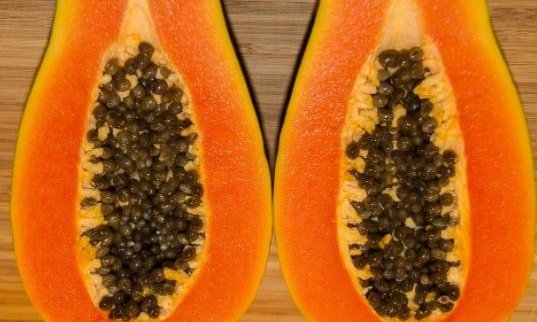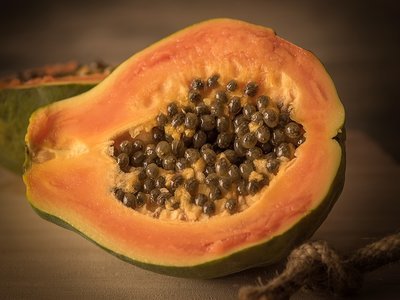Papaya is a delightful tropical fruit with a sweet and musky taste that brightens up any fruit salad. But its appeal goes far beyond its flavor.
Health Benefits of Papaya
The health benefits of a papaya are as abundant as its vibrant flesh is flavorful. Here are eight reasons to incorporate this nutritional powerhouse into your diet:
1. Digestive Health and Enzymes:
Packed with the digestive enzyme papain, papaya aids in breaking down proteins, making the digestive process smoother. This can be particularly helpful for individuals with digestive disorders or those looking to maintain a healthy digestive system.
2. Anti-inflammatory Properties:
Chronic inflammation is at the root of many diseases, but papaya’s chymopapain and papain enzymes have been shown to reduce inflammation, offering a natural way to combat inflammatory conditions.
3. Rich in Antioxidants:
The vibrant orange color of papaya is due to an abundance of antioxidants such as vitamin C, flavonoids, and beta-carotene. These compounds fight free radicals, minimizing oxidative stress and reducing the risk of numerous diseases.
4. Heart Health:
Papaya supports heart health through its fiber, potassium, and vitamins. Together, these elements help combat atherosclerosis and maintain blood pressure levels, promoting overall cardiovascular well-being.

5. Skin Health:
Thanks to vitamin A and papain, eating papaya or using it in topical treatments can assist in shedding dead skin cells, providing a rejuvenated and clearer complexion.
6. Eye Health:
The lutein and zeaxanthin found in papaya protect the eyes from age-related macular degeneration. Plus, vitamin A supports healthy vision and can help decrease the risk of night blindness.
7. Immune Support:
A strong immune system is paramount for maintaining health, and papaya doesn’t disappoint. A single medium fruit provides more than the daily recommended amount of vitamin C, bolstering the body’s natural defenses.
8. Anti-cancer Potential:
Some studies have implicated the antioxidants in papaya as potential anti-cancer agents, particularly in reducing the risk of colon and prostate cancer.
How to Choose a Good Papaya
Choosing a good papaya can be a joyful and rewarding experience for those who love the sweet, tropical fruit. To ensure you end up with a delicious, ripe papaya, follow these helpful tips:
Know the Types of Papayas:
First, it’s essential to know the two most common types of papayas:
- Hawaiian, also known as Solo papayas, are smaller with a more intense sweetness.
- Mexican papayas are much larger and have a milder flavor.
Look at the Skin:
A papaya’s skin speaks volumes about its ripeness.
- Go for papayas that have predominantly yellow skin or a combination of green and yellow. A fully green papaya is immature, while an overly yellow or orange one might be too ripe.
- Avoid papayas with a lot of black spots, bruises, or wrinkles, which suggest over-ripeness or poor handling.
Feel the Texture:
Gently press the surface of the papaya with your thumb.
- A ripe papaya should yield slightly under pressure, similar to a ripe avocado. It should feel soft but not mushy.
- If the fruit is too hard, it is underripe. However, it can ripen over a few days if kept at room temperature.
Check the Shape:
Opt for papayas that have a nice, symmetrical shape.
- Irregularly shaped papayas may have uneven ripeness or texture within.
Smell the Fruit:
Sniff at the base of the papaya where the stalk was attached.
- A ripe papaya will have a sweet, slightly musky scent. If there’s no smell, the fruit may not be ripe yet.
- A fermented or sour smell indicates the fruit is overripe.
Size and Weight:
Don’t be misled by size.
- Choose a papaya that feels heavy for its size, indicating a good water content and ripeness.
Consider Your Plans:
- If you plan to eat the papaya soon, choose one that is just ripe.
- For future consumption, go with a slightly greener papaya and let it ripen at home.
The Ideal Papaya:
Here’s a quick reference for choosing the perfect papaya:
| Skin Color | Texture | Shape | Smell | Weight |
|---|---|---|---|---|
| Yellow & Green | Slightly Soft | Symmetrical | Sweet and Musky | Heavy for Its Size |
Storing Your Papaya:
- If not consuming your papaya right away, store it at room temperature until it reaches your desired ripeness.
- Once ripe, you can keep the papaya in the refrigerator to prolong its life.
Extra Tips:
- Occasionally, you might find papayas with a few black spots. Small spots don’t usually affect the fruit’s flesh, but it’s best to use these papayas quickly.
- If you’re not familiar with the taste, buy a small papaya to start. Once you’ve developed a taste for it, you can move on to larger varieties.
Conclusion
Incorporating papaya into one’s diet can truly transform the landscape of health, from improving digestion to supporting the immune system. A bowl of fresh papaya chunks could be a delightful way to give the body the nourishment it enjoys and deserves.







